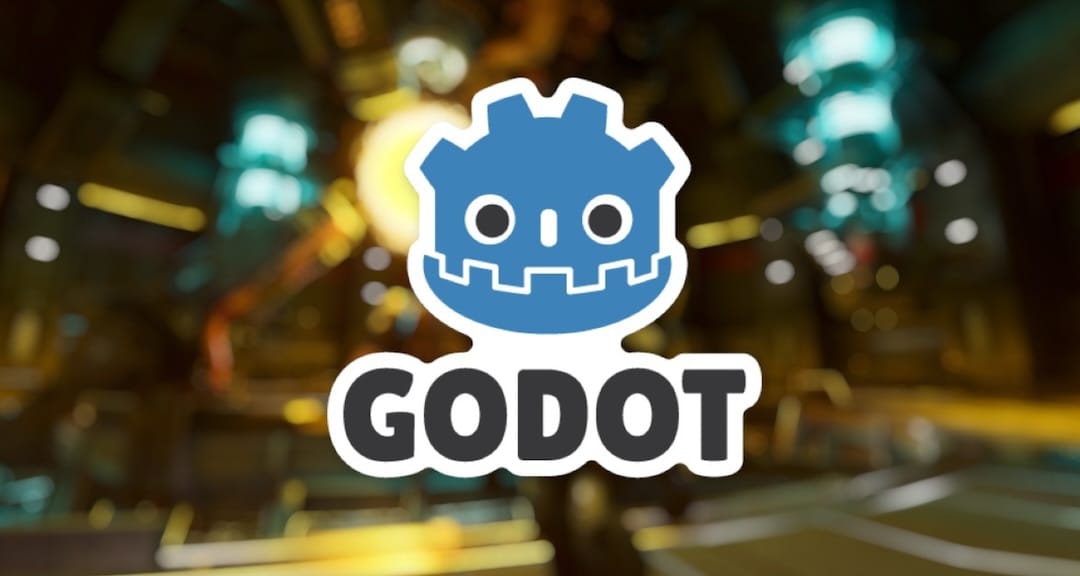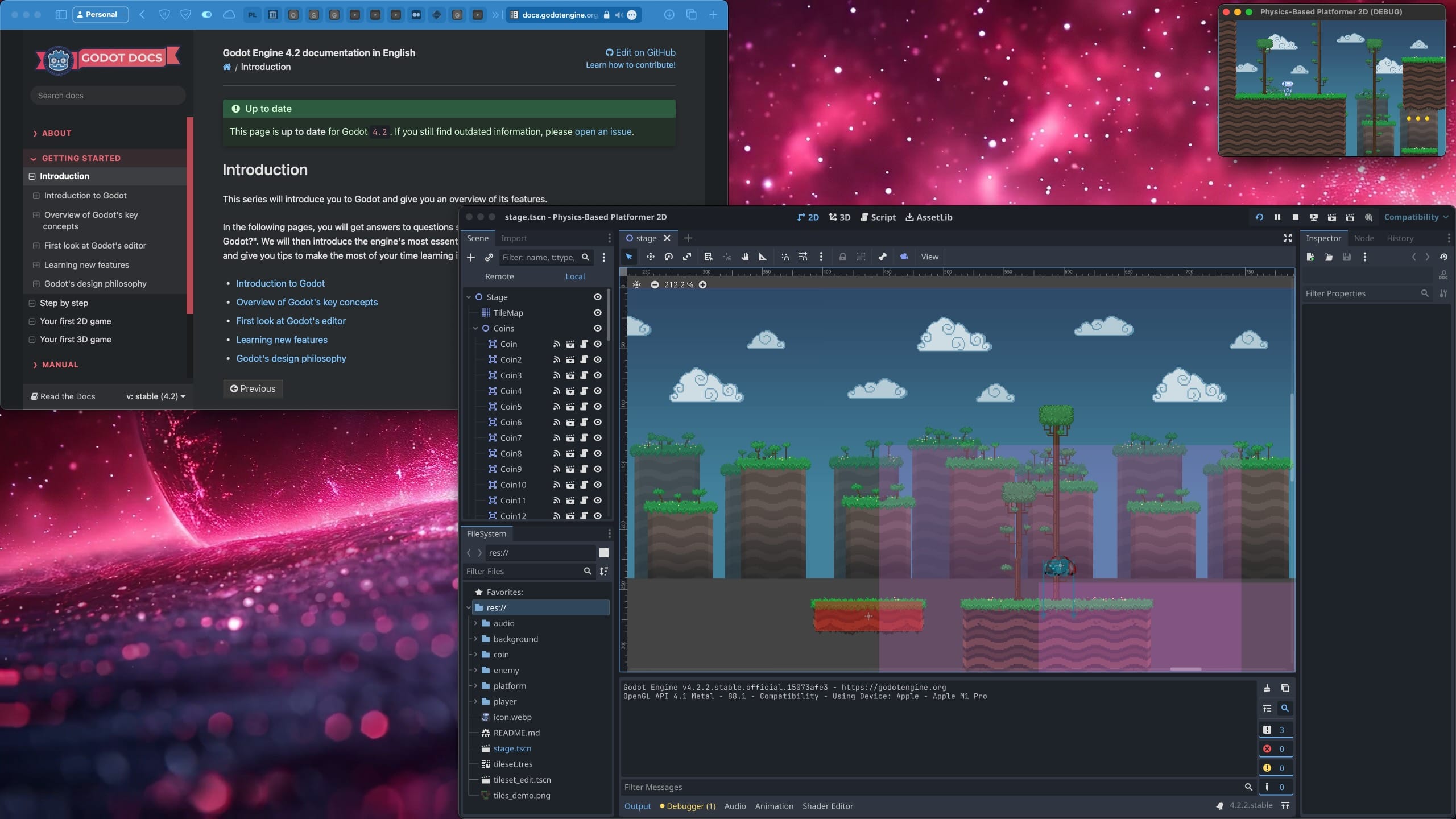Godot Engine to develop your own video games
Godot Engine to develop your own video games

I'm going to tell you a story.
One day, at my grandmother’s house, my father brought a device that was connected to the TV. It was a ZX Spectrum 48k. After plugging it in and watching them load the cassette tapes (with a sound that was a little weird) and playing on the TV, I fell in love with this new machine. I had already seen an Atari with the Pong, but this was another level.
What I didn’t expect was that my father would start typing some letters and numbers that came in the instruction manual, and a few hours later, a spaceship would appear shooting enemies coming down the screen... That completely changed my world. I no longer wanted to be an astronaut, I wanted to be a video game developer!.
Movies like Tron and War Games didn’t help either. The point is, I’ve always had a concern about making video games, and I’ve done some games on MSX with BASIC and PC (DIV!) platform.
When I started growing up, the world of programming took me on other paths. I still have that thorn in my side, and a few months ago, I found out about all the excitement with Unity, and I thought again about an engine that caught my attention since it was released. I even did a talk in my hometown for a developer community. That engine is called Godot Engine, and today I want to talk about it if you don't know it and,... Who knows if I fulfill my dream of creating my own game!
What is Godot Engine?

Godot is a free and open source video game engine. It was created by Juan Linietsky and Ariel Manzur in 2007, and was released to the public in 2014. Today, it is maintained thanks to community donations and the support of some companies. The first thing that stands out is that to start working with it, you only need to download a file of a few megabytes (114 mb compared to the almost 16 GB of Unity!), and you can start to give it a go.
Pros
- Free: There are no licenses or royalties, one of the reasons why many developers are switching to Godot.
- Open source: You can modify the source code and make Pull Requests so that we can all benefit.
- Cross-platform: You can create your games on Windows, Linux and/or macOS. Then the project can also be exported to Android, iOS, HTML5 and consoles such as Playstation, Xbox and Nintendo Switch. By the way, it supports XR (VR) and ARM processors.
- Programming language: You can program in GDScript, a programming language similar to Python, or in C#/C++ among others (Have I seen Rust out there?).
- Community: Very active community, Discord and forums where you can resolve your questions.
- Assets Library: You don’t have to start from scratch. Visit the library where you can find assets visuals, sounds, music. **But remember! **: The assets are there to help you: don’t abuse them. Best of all, there are also tools that allow you to add functionality to Godot.
Cons
- Learning curve: Godot has a somewhat steep learning curve, especially if you do not have previous programming experience.
- Documentation: The documentation of Godot is not as extensive as that of other game engines, although the community is very active, especially after the bad decisions of Unity a year ago.
- Community: As I mentioned, the community is not as big as Unity or Unreal Engine, although it is growing more and more (+info).
- Assets: Although there is a library of assets as I have already mentioned, it is not as abundant as in the engines of competition.
How to start programming in Godot?
To start programming in Godot, the first thing you need to do is download the program from the official website.
Once downloaded, install it on your computer and open it. You will see that the editor is very intuitive and with many options. Although it can be overwhelming so many choices, don’t despair, everything has its function. You can start creating your first game from scratch, import one that you have already made or look at the examples that you can also download from the project menu.
I recommend, if you have no experience, that you start with the tutorials that are in the official website. You can also search for tutorials in YouTube or blogs. I leave you some links at the end of the post.
Tips
- Start with something simple: Don’t try to make a very complex game from the start. As with any working tool, you have to get experience. Go slowly. I would start with a platform game. Try following a tutorial like this one from Youtuber @wye to recreate Super Mario World and then modify it to your liking.
- Try everything Godot can do for you: Godot has many features that can save you time and effort. Try as much as you can and learn to use its options. Start by testing the mechanics, nodes and scripts. Then go for the physics and animations before embarking on a game of your own.
- Patience: Making a game is tedious, difficult, time-consuming, and requires a lot of patience. Don’t despair if it doesn’t come out right away. Try, fail, learn and try again. Set small goals and see them accomplished little by little.
- Learn from the community: Youtube, Discord, forums,... The Godot community is very active and can help you resolve your questions. Don’t be afraid to ask if you don’t understand something. Learn from others by reading code and understand what you intend to do, surely someone has solved the problem you are having with your game before you.
Final words
I just wanted to share with you my adoration for Godot Engine, and encourage you to try it if you have ever felt like me, and you have a desire to create video games. Do not pretend to get rich either or base your careers on it (for now). You do not need to have previous programming knowledge (although it helps). You can always start with tutorials and gradually go forward. If you want to create a game, tell me, I’d love to see it. 😉
Resources
Youtube
XR (VR)
Muddy Wolf > Setting up the XR Origin - Build a VR Game in Godot List
Boon Makes Games > Setting up XR/VR on Godot 4 | First Impressions, Passthrough, Hand tracking